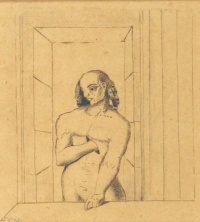Pensées
From The Art and Popular Culture Encyclopedia
|
Related e |
|
Featured: |
The Pensées (literally, "thoughts") represented a defense of the Christian religion by Blaise Pascal, the renowned 17th century philosopher and mathematician. Pascal's own religious conversion had led him into a life of asceticism, and the Pensées were in many ways his life's work. Pascal's Wager is found here.
Although they appear to consist of ideas and jottings, some of which are incomplete, it is believed that Pascal had, prior to his untimely death in 1662, already planned out the order of the book and had arranged the individual scraps of paper, on which the "thoughts" were written. Those responsible for his effects, failing to recognise the basic structure of the work, handed them over to be edited, and they were published in 1669. But it was not until the beginning of the 20th century that scholars understood Pascal's intention, and present-day editions of the book contain his "thoughts" in more or less the order he left them.
Several attempts have been made to arrange the notes systematically; notable editions include those of Brunschvicg, Louis Lafuma, and (most recently) Sellier. (See, also, the monumental edition of his Oeuvres complètes (1964–1991), which is known as the Tercentenary Edition and was realized by Jean Mesnard; this edition reviews the dating, history, and critical bibliography of each of Pascal's texts.)
The original layout of the individual notes was in fact recorded in situ, although this was not reflected in published editions of the work until recently, because the colleagues of Pascal who edited his notes after his death switched the order of the book's two main sections. Early editions led off with the traditional Christian content, leaving Pascal's reflections on the human condition until the end. The structure of the apology Pascal intended is best described by H. F. Stewart D.D. in the preface to his translation of the Pensees: Part I shows "from Nature" that man is wretched without God, Part II shows "from Scripture" that Jesus is the Redeemer of mankind. Part I subdivides into Ia (man without God) and Ib (man with God) to show man's inherent wretchedness. The themes of Part I are largely in the tone of vanitas mundi, after the tradition of Solomon's book of Ecclesiastes, while the many short maxims inserted into the text are reminiscent of Solomon's Book of Proverbs.


